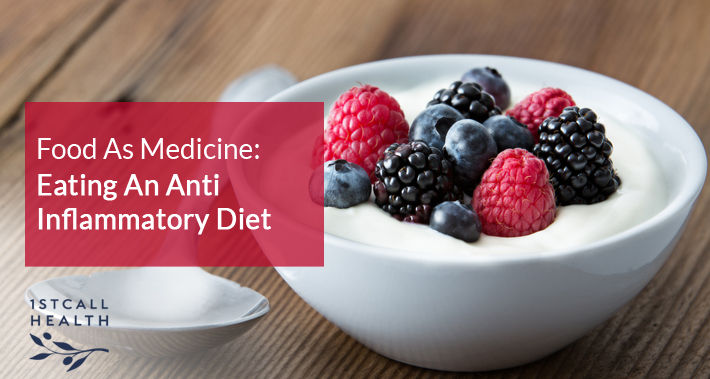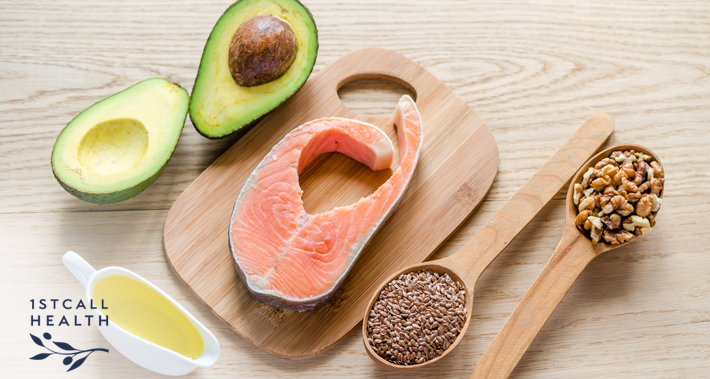
Inflammation is linked to heart disease, cancer, diabetes, and a whole host of other health concerns.
You might already be familiar with the signs of acute inflammation – redness, swelling, heat, and pain.
But did you know that chronic inflammation can cause health issues without producing these outward symptoms?
Choosing an anti inflammatory diet can protect your health and alleviate symptoms like fatigue, abdominal pain, and joint pain.
Here at 1stCallHealth, we’re a nurse practitioner clinic in DC, and we want to help you stay healthy.
Today, let’s take a look at inflammation.
What it is, what causes it, and how your diet can help reduce it.
What Is Inflammation?
When your body detects infection, illness, or injury your inflammatory response will kick in.
Think of the fever and aches that might have accompanied a bad case of the flu when you were a kid.
Or think of the way the area around your cuts and scrapes might swell up, getting red and hot to the touch.
These are all signs of acute – or short term – inflammation.
Your body responds to infection and injury with typical signs of inflammation – swelling, redness, heat, and pain.
But why does your body react this way?
What’s going on underneath the surface to produce this swelling, redness, heat, and pain?
When your body detects illness or injury, it produces infection fighters – white blood cells and cytokines.
White Blood Cells
Most of your white blood cells are made in your bone marrow, and some are produced in your lymph nodes, thymus gland, and spleen.
Also known as your immune cells, white blood cells can be found in your blood and various tissues in your body.
They travel through your bloodstream and your soft tissue to find and fight off sources of infection.
When your white blood cells find an infection, they send out signals to other parts of your body.
These signals encourage your body to produce more white blood cells and direct them towards the infected area.
The increased blood flow to the area produces the redness and warmth that we associate with inflammation.
Cytokines
Cytokines are proteins that your immune system uses as chemical messengers.
Cytokines are produced by white blood cells and various cells in your organs, connective tissue, and more.
These proteins signal cells in your body, telling them where to go, what to do, and when to multiply as needed.
Cytokines can promote or discourage inflammation.
Pro inflammatory cytokines rally your body’s immune response, encouraging white blood cell production to fight infection.
Anti inflammatory cytokines dampen your immune response, signaling your body to stop fighting to protect healthy tissue.
Is Inflammation Always A Bad Thing?
Inflammation isn’t necessarily a bad thing – it’s one of your body’s built in protective responses, after all.
When you injure yourself or get sick, you might experience acute inflammation.
Acute inflammation looks like redness, pain, swelling, and heat, usually just in the affected area.
White blood cells and cytokines help the tissues in the affected area to fight infection and repair damage.
While inflammation is an important protective function in your body, long term inflammation can cause other issues.
Stress and anxiety, body composition, and some illnesses are linked to chronic inflammation.
Chronic inflammation is long term and internal – you might not see signs of acute inflammation like redness or swelling.
While you might not notice symptoms of chronic inflammation, it can contribute to some serious health issues.
Diabetes, heart disease,, cancer, fatty liver disease, and many other health concerns are all associated with chronic inflammation.
What Are The Signs Of Inflammation?
You probably already know the signs of acute inflammation – redness, pain or tenderness, swelling, and heat.
Chronic inflammation can be harder to detect because many of its symptoms resemble other health concerns.
Symptoms of chronic inflammation include:
- Abdominal pain
- Chest pain
- Digestive issues
- Fatigue
- Fever
- Joint pain
- Mouth sores
- Rashes on the skin
What Causes Inflammation?
Inflammation is part of your body’s natural immune response to infection, illness, or injury.
On a cellular level, inflammation is caused by the messages and actions of your white blood cells and cytokines.
Acute inflammation is often a response to something identifiable – a virus, bacteria, fungi, chemical irritant, or an injury.
The causes of chronic inflammation can be a little harder to pin down.
Both chronic and acute inflammation can be the result of environment, underlying health issues, and lifestyle factors.
Environmental Factors
Inflammation can sometimes be a sign that your body is reacting to something in your environment.
If you have been exposed to environmental toxins, like pollution or strong chemicals, your body may respond with inflammation.
Sometimes inflammation can be the result of contact with everyday chemicals as well.
Perfumes and dyes found in detergents, toiletries, and household cleaning products have all been known to trigger inflammation.
Medical Conditions
Several medical conditions are associated with chronic inflammation.
Medical conditions that are accompanied by increased levels of inflammation include:
- Alzheimer’s disease
- Asthma
- Type 2 diabetes
- Cancer
- Heart disease
Chronic inflammation is also linked with many autoimmune disorders.
In autoimmune disorders your immune system may misidentify healthy tissue, triggering your body’s inflammatory response.
Autoimmune disorders that are accompanied by chronic inflammation include:
- Ankylosing spondylitis
- Type 1 diabetes
- Gout
- Crohn’s disease
- Lupus
- Multiple sclerosis
- Rheumatoid arthritis
Lifestyle Factors
Some of your everyday habits might contribute to inflammation.
The good news is that many of these factors can be changed by making minor adjustments in your life.
Physical Inactivity
Physical inactivity has been shown to promote inflammation.
If you don’t get much movement during your daily activities, inflammation may impact you.
If you currently spend a lot of your time in one position, try taking movement breaks at least once an hour.
Take a short walk, do a few stretches – you can even do exercises in bed if you’re unable to get up.
Any kind of movement will help relieve strain, get your blood flowing, and decrease the inflammatory factors in your system.
You don’t have to hit the gym every day to reduce inflammation.
Medical professionals recommend 150 minutes of moderate physical activity each week.
This can include going to the gym, but it can also include chores, recreation, and modifications to things you already do.
Any activity that gets your heart rate up, works up a sweat, and makes you breathe a little more heavily can do the trick.
Mopping, vacuuming, and scrubbing the bathtub might be tasks around the house that help you get some activity.
If you enjoy walking, dancing, or gardening, do those.
You can also make small changes like parking farther from your destination and taking the stairs to get more movement in.
Lack of Sleep
Not getting enough sleep has negative impacts on everything from your metabolism to your ability to think.
Your body needs rest to properly regulate many internal functions, and inflammation is no exception.
Not getting enough sleep can impact your immune system’s ability to signal and respond properly to things going on in your body.
Try to get between seven and nine hours of sleep each night.
Dietary Habits
Diet plays a role in inflammation as well.
What you eat can impact your levels of inflammation positively and negatively.
A diet rich in antioxidants can protect your body from cellular damage, which helps you avoid an inflammatory immune response.
Some foods can damage and impair various internal symptoms, contributing to imbalances and inflammatory responses.
High amounts of sugar, trans fats, vegetable oils, processed meats, and alcohol in your diet can promote inflammation.
Speaking of which…

What Is An Anti Inflammatory Diet?
An anti inflammatory diet minimizes foods that encourage inflammation while increasing foods that fight inflammation.
In general, anti inflammatory diets emphasize whole foods that offer lots of nutrients and contain antioxidants.
Antioxidants are natural compounds that help your body protect your cells by neutralizing free radicals.
Free radicals are broken molecules that can cause damage in your body when they try to bond to atoms in your cells.
Having too many free radicals in your body encourages aging and can lead to oxidative stress, which encourages inflammation.
Antioxidants protect your health and reduce inflammation by bonding with free radicals and helping your body eliminate them.
To follow an anti inflammatory diet, you may also need to reduce your intake of alcohol and processed sugars, oils, and meats.
Foods That Trigger Inflammation
Foods that trigger inflammation tend to be processed, with added sugar, salt, and fat for flavor and texture.
RELATED: The Hidden Dangers Of Processed Sugar
These foods include:
- Alcohol
- Processed carbs, including white bread and white pasta
- Processed snacks, like chips and many crackers
- Packaged desserts, like cookies, candy, and ice cream
- Certain oils and fats, like trans fat and hydrogenated vegetable oil
- Processed meats, like deli meat or sausages
- Many canned foods including canned vegetables with added salt, pasta sauces, and canned soup
- Other processed foods and many readymade meals
Many people also avoid certain foods that may cause irritation or inflammation.
Gluten and Carbohydrates
Gluten and carbohydrates may encourage inflammation for some people.
Gluten creates a severe immune response in people with celiac disease, and it can also encourage inflammation in some others.
Some people who reduce their gluten intake are, in fact, seeing the benefits of a diet that is lower in carbohydrates.
Diets high in carbohydrates are linked to inflammation in some people.
You don’t have to eliminate carbs altogether, though – cut out processed carbs in favor of nutrient dense options.
Some carbs to enjoy in a balanced diet include whole wheat breads, oatmeal, and nutrient rich sweet potatoes.
Nightshades
Some people with inflammatory conditions find that plants from the nightshade family will trigger inflammation.
Nightshades are a group of plants from the family Solanaceae.
This family of flowering plants include many common foods, such as:
- Eggplant
- Bell peppers
- Chili peppers
- Potatoes
- Tomatoes, tomatillos, and physalis
Evidence about the relationship between nightshades and inflammation is limited.
If you think nightshades are adding to your inflammation, try cutting them out for two to three weeks to test your symptoms.
Foods That Reduce Inflammation
There are three golden rules when it comes to deciding what to eat when following an anti inflammatory diet.
First, choose foods that are rich in nutrients.
Second, consume a range of antioxidants.
Third, choose foods that are rich in healthy fats.
Balance is also key to a successful anti-inflammatory diet.
Make sure that your meals are nutrient dense, contain vitamins and fiber, and offer a balance of carbs, protein, and fats.
Some foods to integrate into your anti inflammatory diet:
Antioxidants
There are a wide variety of different antioxidants you can get in your diet.
Some are vitamins, like vitamin A, vitamin C, and vitamin E.
Others are minerals – copper, zinc, and the thyroid supporting mineral selenium.
Still others might be things you’ve never heard of, like lutein, isoflavonoids, and beta-carotene.
One of them is even a hormone – melatonin.
But they all have anti inflammatory properties.
From a dietary perspective, antioxidants are found in:
- Fruits, especially blueberries, cherries, blackberries and strawberries
- Dark chocolate (70% cacao or higher)
- Dark leafy green vegetables like spinach and chard
- Cruciferous vegetables like broccoli, kale, and cabbage
Healthy Fats
- Fatty fish like salmon and tuna
- Nuts and seeds, especially walnuts and pumpkin seeds
- Olives and olive oil
- Avocados
Other Foods with Anti Inflammatory Properties
- Lentils and beans – also a good source of fiber
- Fresh or lightly cooked vegetables
- Ginger and turmeric
- Probiotics like yogurt, kimchi, and salt cured pickles
- Green tea
Book Your Appointment With 1stCallHealth Today
If inflammation has been slowing you down and affecting your health and quality of life, it may be time for a change.
Adopting an anti inflammatory diet is an effective way to improve your health and avoid more serious illnesses.
For support making the transition to an anti inflammatory diet, book an appointment with 1stCallHealth Today.
1stCallHEALTH
1331 H St NW Ste 200,
Washington, DC 20005
(202) 590-0009
– https://goo.gl/maps/MVhjkz2jqynWpsgo6
1stCallHEALTH provides affordable access to primary care services. We believe that everyone deserves affordable, high quality primary care.
Our vision is to challenge the status quo, focus on the individual, and empower personal control to change the way we think about healthcare.




